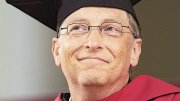Editor’s note: Walter Isaacson ’74, a member of the Board of Overseers and biographer of Steve Jobs and others, is writing a book about the great inventors of the digital age. The following is his abridgment of a section on Bill Gates ’77, LL.D. ’07, co-founder of Microsoft, who now runs the Bill & Melinda Gates Foundation. Gates returned to campus for a discussion on philanthropy as part of the campaign launch. For the full version, which was published online then, please go to https://harvardmag.com/gates-13.
It may have been the most momentous purchase of a magazine in the history of the Out of Town Newsstand in Harvard Square. Paul Allen, a college dropout from Seattle, wandered into the cluttered kiosk one snowy day in December 1974 and saw that the new issue of Popular Electronics featured a home computer for hobbyists, called the Altair, that was just coming on the market. He was both exhilarated and dismayed. Although thrilled that the era of the “personal” computer seemed to have arrived, he was afraid that he was going to miss the party. Slapping down 75 cents, he grabbed the issue and trotted through the slush to the Currier House room of Bill Gates, a Harvard sophomore and fellow computer fanatic from Lakeside High School in Seattle, who had convinced Allen to drop out of college and move to Cambridge. “Hey, this thing is happening without us,” Allen declared. Gates began to rock back and forth, as he often did during moments of intensity. When he finished the article, he realized that Allen was right.
What Gates and Allen decided to do, during the Christmas break of 1974 and the subsequent January reading period, was to write some software that would make it possible for hobbyists to create their own programs on the Altair. Specifically, they decided to write an interpreter for the programming language known as BASIC. It would become the first programming language for a microprocessor. In other words, it would launch the personal computer software industry.
“When Paul showed me that magazine, there was no such thing as a software industry,” Gates recalled. “We had the insight that you could create one. And we did.” Years later, reflecting on his innovations, he said, “That was the most important idea that I ever had.”
Gates wrote the BASIC interpreter code on yellow legal pads. “I can still see him alternately pacing and rocking for long periods before jotting on a yellow legal pad, his fingers stained from a rainbow of felt-tip pens,” Allen recalled. Then he perfected it on a simulator Allen had created on a PDP-10 mainframe in Harvard’s Aiken computer lab. “Bill moved to a terminal and peered at his legal pad as he rocked. Then he’d type a flurry of code with those strange hand positions of his, and repeat. He could go like that for hours at a stretch.”
Gates ignored the exam cramming he was supposed to be doing and even stopped playing poker. For eight weeks, he and Allen and Davidoff holed up day and night at the Aiken lab making history. Occasionally they would break for dinner at Harvard House of Pizza or at Aku Aku, an ersatz Polynesian restaurant. In the wee hours of the morning, Gates would sometimes fall asleep at the terminal. “After dozing an hour or two, he’d open his eyes, squint at the screen, blink twice, and resume precisely where he’d left off—a prodigious feat of concentration,” Allen recalled. As Gates later recalled, “It was the coolest program I ever wrote.”
Allen flew off to Albuquerque and demonstrated the software to Ed Roberts, the founder of the fledgling company that had created the Altair. He agreed to license it. Gates and Allen, who dubbed their new venture Micro-Soft, were officially in business. When Allen arrived back in Cambridge, bringing with him a working Altair to install in Gates’s room, they went out to celebrate. Gates had his usual: a Shirley Temple, ginger ale with maraschino cherry juice.
A month later, Roberts offered Allen a fulltime job in Albuquerque. Gates decided to stay at Harvard, at least for the time being. There he endured what has become a rite of passage, amusing only in retrospect, for many of Harvard’s most successful students: being hauled before the Administrative Board for a disciplinary process. Gates’s case arose when auditors from the Defense Department decided to check the use of the PDP-10 that it was funding. They discovered that one sophomore—W. H. Gates—was using most of the time. After much fretting, Gates prepared a paper defending himself and describing how he had created a version of BASIC using the PDP-10. He ended up being exonerated for his use of the machine, but he was “admonished” for allowing a non-student, Allen, to log on with his password.
By that time, Gates was focusing more on his software partnership than his course work. He finished his sophomore year that spring, but then flew to Albuquerque for the summer and decided to stay there rather than returning for the first semester of his junior year that fall. He went back to Harvard for two more semesters—in the spring and fall of 1976—but then left for good, two semesters shy of graduating. In June 2007, when he returned to Harvard to get an honorary degree, he began his speech by directing a comment to his father in the audience. “I’ve been waiting more than 30 years to say this: Dad, I always told you I’d come back and get my degree.”









